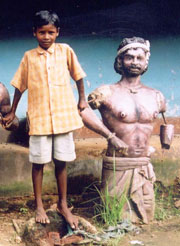Film premiere highlights plight of indigenous peoples

Kanhu Murmu, with statue of his ancestor, rebellion leader Kanhu Murmu
A film commemorating the uprising that changed the face of colonial rule in India will be premiered at a conference at the University of Sussex.
Hul Sengel: The Spirit of the Santal Revolution, tells the story of the Hul (revolution) led by the Santal community in India against the East India Company in 1855-56. The anti-colonial rebellion had a significant impact on the way colonialists governed India, although some of the so-called 'rebel leaders' were executed.
Made to mark the 150th anniversary of the Santal Hul, the documentary was shot on location in 2004 in Jharkhand State and New Delhi by Dr Daniel Rycroft of the University of Sussex, in collaboration with the Indian Confederation of Indigenous and Tribal Peoples. Scheduled for broadcast on Indian television later this year, the film unites protests past and present, carried out by communities battling for survival against the forces of industrialisation, globalisation, social prejudice and poverty. It features rare footage of an interview with the descendants of the leaders of the Santal uprising and scenes of a recent protest against the Indian government in New Delhi.
The film is one of the highlights of a three-day conference - 'Reinterpreting Adivasi Movements in South Asia', March 21-23 - hosted by the Centre for World Environmental History at the University of Sussex. Its aim is to draw attention to the struggles faced by the 100 million people who make up South Asia's oppressed ethnic and indigenous people, known collectively as Adivasi.
Conference organiser Dr Daniel Rycroft says: "Many of the regional governments in India have lost sight of both traditional and modern Adivasi rights. For many poor Adivasis development means oppression, displacement and further poverty.
"Making this film was very exciting, I think that it is important for viewers to learn about the historical and social significance of the Santal revolution as it possesses a strong message for ongoing movements against injustice."
Among international scholars and activists attending the conference are: keynote speaker Dr Crispin Bates, of the University of Edinburgh, who is researching Adivasi insurgencies in the Indian state of Madhya Pradesh; Dominic Mardi, Secretary-General of the Indian Confederation of Indigenous and Tribal Peoples, and Dhuni Soren of the World Adivasi Council.
Dr Vinita Damodaran, Director of the Centre for World Environmental History, says: "The capitalist elites in India's industrial heartland are using traditional caste privileges to push the Adivasis to the edges of a nation that they themselves have fought so strongly for."
Notes for editors
For more information on the conference, see www.sussex.ac.uk/development/adivasi
For interviews, screening details etc, please contact University of Sussex Press officers Maggie Clune or Jacqui Bealing, tel: 01273 678 888 or email M.T.Clune@sussex.ac.uk or J.A.Bealing@sussex.ac.uk
Useful links
Information for Journalists Previous press releases